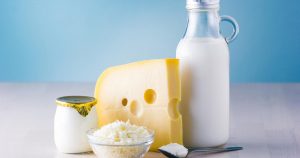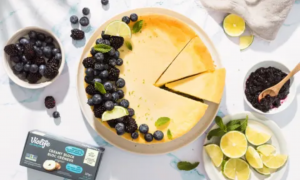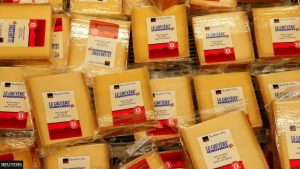
It looks like cheese, melts like cheese, even stretches like cheese. But it’s not cheese. At least, not a cheese made from milk.
Researchers in the Department of Food Science at the University of Guelph, Ont. have been working on a “cheese analogue” — a non-dairy cheese — that they are confident is more nutritious and better suited for a variety of cooking applications than many non-dairy cheese products currently on the market.
“This is a new plant-based cheese. A lot of other products don’t stretch or melt, or have [milk-based cheese’s] high nutritional value. We’re using the fundamental knowledge that we have about plant-protein ingredients to create something that has the desired texture and taste,” said researcher Stacie Dobson, a Ph.D. student in food science at the university.
For several years, Dobson has been creating iterations of plant-based cheese and testing them in foods such as grilled sandwiches, striving to perfect the recipe.
Advising Dobson in her research is Alejandro Marangoni, Canada Research Chair and professor of food, health and aging in Guelph’s food science department.

“The work that Dobson and the rest of us are doing here in the lab is to improve on the nutritional properties, increasing protein content, increasing micro-nutrient content as well as improving the functionality of the product,” Marangoni said.
Building blocks of plant-based cheese
The team uses familiar kitchen tools including a hotplate, spatula, cutting board and knife. But there’s also a “texture analyzer,” a machine that mimics chewing and provides data about properties such as hardness, chewiness and springiness. Dobson’s main ingredients are a plant protein, starch, coconut oil, salt, lactic acid and water.
“Most of the foods that you eat are proteins, starches and carbohydrates, and fat. Those ingredients, depending on how we mix them together, are the same building blocks that we’re using to make plant-based cheese,” Dobson said.
Understanding the intrinsic qualities of the ingredients allows Dobson to create recipes that meet the needs of various culinary applications — the functionality of the “cheese.”
“With food science, we can change the properties of the cheese. I can make it a drier texture similar to Parmesan versus one that you want to be ooey-gooey like mozzarella, or something like a cheese slice,” she said.
Grilled cheese test
On the lab bench are a half-dozen labelled bags containing bits of shredded white “cheese” that look like what you might find in a grocery store dairy case.

Dobson switches on the hot plate and readies a frying pan; she spreads margarine on slices of German sourdough bread, loads some plant-based cheese on the lower slice and crowns it with another bread slice. She then places the experimental sandwich into the pan.
In about the same time it would take anyone to make a grilled cheese sandwich at home, Dobson has flipped the cheese lab sourdough sandwich a couple of times and cooked it to a golden brown.
Bits of the cheese that have hit the hot pan melt and then get crispy, like the “cheese skirt” of any melted cheeseburger or sandwich that’s been seared on a flat-top grill.
When the bread slices are tentatively pulled apart, strings of cheese stretch between the two slices. Acting like dairy cheese when cooked is the latest lab advancement.
Next step: retail-level production
Among your neighbourhood grocery store’s current plant-based cheeses are products by Daiya, a Vancouver-based manufacturer of dairy-free foods, and a partial funder of Dobson and Marangoni’s research. The company will use the University of Guelph technology and scientific developments in the manufacture of plant-based foods.

“The next steps are to begin the scaling [for manufacture] of the product and hopes to reach retail-level production,” Dobson says.
Environmental motivator
Creating a delicious, plant-based cheese is first and foremost for the lab; however, reducing the impact that food production has on the environment is a close second, according to Marangoni.
“We live in very critical times in our world right now. One of our main motivations is to improve the sustainability of our food supply. We’re not here to replace animal products with plant-based, but rather to create a variety in which we decrease our impact just because we are so many humans in the world,” he said.
Marangoni, citing the latest report from the Good Food Institute, says the demand for animal-based products will reach 400 million tonnes by 2030.
“We will be close to only replacing six per cent [of that]. It’s a gigantic transition that would have to take place. We need to produce enormous amounts of plant protein and starches and build factories that can produce these products,” he said.
But does it taste like cheese?
When I took a bite, Dobson’s grilled “cheese” sandwich was crispy on the outside and creamy and gooey inside with hot cheese that had good “stretch.”
You wouldn’t have been able to tell it was a plant-based product and, as Marangoni adds, you’re also getting less fat in your diet.
Can this cheese analogue, still being developed in the lab, replace a nice chunk of Beemster or a creamy Havarti? Well, it’s really not designed or intended to do that, say the researchers.
“To me, this cheese analogue gets there. It doesn’t exactly mimic a dairy product, but for most industrial applications,” he said — such as in cooked products or even retail burgers or grilled sandwiches — “I think you’d have a really hard time telling our plant-based product from the animal-based one.”

























